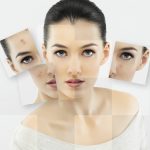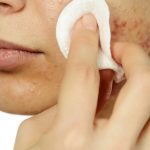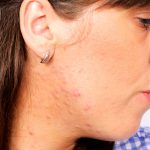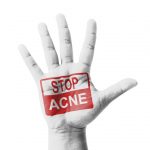Is Adult Acne Ruining Your Life?
Celebrities such as Britney Spears, Eva Longoria and even Kate Moss have suffered with adult acne. A dult acne can be horrific, so what is acne? Acne, for those of you lucky enough to have not experienced it, is a skin condition which is quite common in adolescents between the ages of 11 and 30 years of age, however there are some adults who have experienced acne later in life. This skin condition is indicated by red spots or pimples on the skin. These ‘breakouts’ can occur on the neck and chest however, they are more commonly present on the face. These spots are caused by inflamed or infected sebaceous glands. As dirt, dead skin cells and excess oil all combine on the skins surface, they block your pores. As this occurs, this causes the Propionibacteria to reproduce quicker within the sebaceous glands, these high levels of Propionibacteria cause trouble for your skin.
dult acne can be horrific, so what is acne? Acne, for those of you lucky enough to have not experienced it, is a skin condition which is quite common in adolescents between the ages of 11 and 30 years of age, however there are some adults who have experienced acne later in life. This skin condition is indicated by red spots or pimples on the skin. These ‘breakouts’ can occur on the neck and chest however, they are more commonly present on the face. These spots are caused by inflamed or infected sebaceous glands. As dirt, dead skin cells and excess oil all combine on the skins surface, they block your pores. As this occurs, this causes the Propionibacteria to reproduce quicker within the sebaceous glands, these high levels of Propionibacteria cause trouble for your skin.
Even though acne is more common in teenagers, about 25% of adults suffer with this downright depressing skin condition. You begin to think that you have finally grown up and have moved through puberty without a scratch, and then, BAM – adul t acne comes and quite literally smacks you in the face.
t acne comes and quite literally smacks you in the face.
Not only are grown up woman tackling wrinkles, they can also be battling with zits too. However, do not be disheartened, you do not have to revert back to childhood. With a few simple changes to your lifestyle, a savvy skin care regime and Nuriss acne treatment, you will be well on your way to battling adult acne.
Some women may find that they have never experienced acne in their teens and then certain factors trigger these breakouts, these can include; hormonal changes, diet and stress.
Hormonal
Adult acne affects the sebaceous glands next to your hair follicles and certain hormones can cause these glands to produce excess oil. This excess oil stimulates the Propionibacteria, which therefore becomes more aggressive and causes the skin to become inflamed and infected. According to our Dr Anita, “The hormones also thicken the inner lining of the hair follicle, causing blockage of the pores (opening of the hair follicles).”
You might be surprised how much your diet can affect your skin. Remember that your skin is the perfect reflection of how healthy your body is, so if you’re experiencing a breakout you may need to look at your diet.
High sugar diets have been scientifically proven to cause ‘breakouts’ on individuals who suffer with acne. As the sugar levels in your blood stream increases, as does your insulin level and it is the insulin which can affect the oil production within the sebaceous glands. So, if you suffer with adult acne, watching your sugar intake, can be extremely helpful.
Eating a lot of vegetables can also be very important. Vegetables contain a large amount of antioxidants which can reduce inflammation.
Stress
Stress can definitely cause breakouts in adult acne. Stress causes the release of the ‘stress hormone’ called Cortisol. In turn, cortisol is broken down within the body into another hormone called ‘testosterone’. Testosterone is a male hormone which causes the sebaceous glands to pump out excess oil, which can lead to breakouts.
SO, HOW CAN WE DEFEND AGAINST BREAKOUTS?
Although there is no cure for acne, there are certain things that you can do to help reduce the inflammation and infections within your skin cells.
- Cleaning the affected area, twice daily can help reduce the amount of excess oil, dead skin cells and dirt which builds up on the skin. This will not stop new spots developing, however it is still important.
- Exfoliate your skin 3 times a week. This will help unclog your pores and remove dead skin cells. Do not overdo it as exfoliation can also cause your skin to become irritated.

- Acne does not necessarily mean that the skin has excess moisture, so using a non-clogging, oil free moisturiser is very important.
- As we mentioned before, eating a low sugar diet can help reduce an acne breakout.
- Additionally, a high vegetable intake is great to reduce inflammation within the body and on the skin.
- Reduce the amount of stress in your life, maybe make your partner make dinner for when you get home or find some stress relieving exercises to enjoy such as boxing.
If none of these natural ways help to reduce or get rid of your adult acne, there are some topical treatments that you can try. If y our acne persists, then speak to your doctor or pharmacist, who can help you with creams, lotions and gels. Some individuals suffer with acne not only on their face, but also on their chest, neck and back. If this is happening to you, then you may need an antibiotic or steroid cream.
our acne persists, then speak to your doctor or pharmacist, who can help you with creams, lotions and gels. Some individuals suffer with acne not only on their face, but also on their chest, neck and back. If this is happening to you, then you may need an antibiotic or steroid cream.
If none of these treatments seem to help, then ‘Nuriss Acne Treatment’ should be considered. “At Nuriss Skincare and Wellness Clinic our experts are here to help” says our Dr Anita. She continues, “We often combine our in-house skincare treatments with your own tailor-made ‘take home Nuriss skincare treatments,’ which work in synergy to quickly and effectively clear up your acne and help to reduce further flare-ups”.
So not to worry ladies, there are many ways to help you get back on your feet and ready to fight another ‘acne-free’ day!




